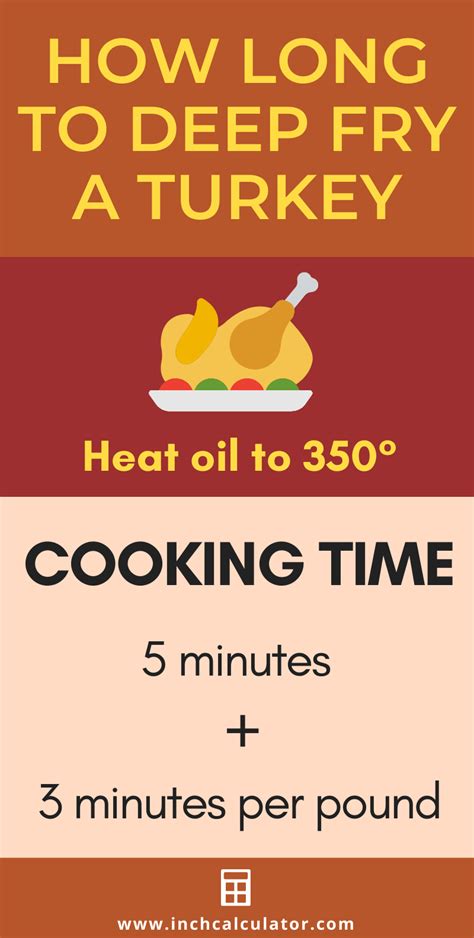How Long to Deep Fry a Turkey: A Guide to Crispy, Juicy Perfection
Deep-frying a turkey delivers incredibly crispy skin and juicy meat, but improper frying time can lead to disaster. This guide will help you calculate the perfect frying time for your turkey, ensuring a delicious and safe Thanksgiving (or any day!) feast.
Understanding the Variables
The time it takes to deep fry a turkey depends on several crucial factors:
- Turkey Weight: This is the most significant variable. Heavier turkeys require longer frying times.
- Oil Temperature: Maintaining the correct oil temperature (around 350°F or 175°C) is crucial. Too low, and the turkey won't cook properly; too high, and you risk burning it.
- Turkey Size and Shape: Even turkeys of the same weight can vary in size and shape, affecting cooking time. A more compact turkey will fry faster than a longer, thinner one.
- Oil Type: While peanut oil is a popular choice for its high smoke point, other oils with similarly high smoke points can also be used. The oil type itself doesn't significantly impact cooking time.
Calculating Frying Time: The General Rule
The most commonly cited rule is to fry a turkey for approximately 3-4 minutes per pound. This is a good starting point, but it's essential to monitor the internal temperature.
Example: A 12-pound turkey would take approximately 36-48 minutes.
Important Note: This is just an estimate. Always use a meat thermometer to ensure the turkey reaches a safe internal temperature of 165°F (74°C) in the thickest part of the thigh and breast.
Beyond the Basic Calculation: Refining Your Timing
While the 3-4 minutes per pound rule provides a good baseline, several factors can influence the actual frying time:
Monitoring Oil Temperature:
- Consistent Temperature is Key: Use a reliable thermometer to monitor the oil temperature throughout the frying process. The temperature will likely drop when you initially submerge the turkey. Adjust your burner as needed to maintain a consistent 350°F (175°C).
- Temperature Fluctuations: If the oil temperature drops significantly, it will increase the cooking time. Be prepared to adjust the heat source accordingly.
Turkey Preparation:
- Thawing: Ensure your turkey is completely thawed before frying. A partially frozen turkey will increase frying time and may not cook evenly.
- Brining (Optional): Brining can add flavor and moisture but may slightly increase cooking time.
Using a Thermometer:
- Don't Rely on Time Alone: Always use a meat thermometer to check the internal temperature of the turkey. This is the most accurate way to ensure it's fully cooked.
- Check Multiple Locations: Take temperature readings in several areas of the turkey, including the thickest part of the thigh and breast.
Safety First: Deep Frying Precautions
Deep-frying turkeys can be dangerous if not done properly. Always follow these safety precautions:
- Outdoor Frying: Deep fry your turkey outdoors, away from any flammable materials.
- Stable Setup: Ensure your fryer is stable and on a level surface.
- Proper Ventilation: Ensure adequate ventilation to prevent the build-up of potentially flammable gases.
- Never Leave Unattended: Always monitor the frying process and never leave the fryer unattended.
- Careful Oil Handling: Be cautious when handling hot oil; it can cause severe burns.
By carefully considering these factors and using a meat thermometer, you can ensure your deep-fried turkey is perfectly cooked and safe to enjoy. Happy frying!
